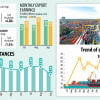India curbs land port imports from Bangladesh

India has imposed restrictions on the import of garments, agro-processed foods, furniture and other goods from Bangladesh through land ports, a move likely to disrupt trade flows and increase logistical challenges for exporters.
According to a notification issued yesterday by India's Directorate General of Foreign Trade (DGFT), garments -- the single largest Bangladeshi export to India -- will only be allowed entry through two sea ports: Kolkata and Nhava Sheva near Mumbai. The rules take immediate effect.
This is essentially a non-tariff barrier to our garment exports. Now that shipments must go through sea ports, lead times will increase significantly, which in turn will raise costs for Indian importers sourcing from Bangladesh.
The notification also bars imports of fruits, carbonated and fruit-flavoured drinks, processed foods, cotton and cotton yarn waste, PVC and plastic products, and wooden furniture via land ports in Assam, Meghalaya, Tripura, Mizoram, and the West Bengal crossings at Phulbari and Changrabandha.
However, the restrictions will not apply to fish, liquefied petroleum gas, edible oils, or crushed stone. Nor will they affect Bangladesh's exports to Nepal and Bhutan transiting through Indian territory.
The move follows India's earlier decision in April to suspend transhipment facilities for Bangladeshi cargo bound for third countries via Indian land borders, raising concerns about tightening trade conditions.
India is one of Bangladesh's fastest-growing apparel markets, with garment exports valued at about $700 million annually. Around 93 percent of those shipments move through land ports, making the new restrictions especially disruptive. Bangladesh exported $1.55 billion worth of goods to India in fiscal 2023-24, down 9 percent year-on-year, according to data from the Export Promotion Bureau.
Anwar-Ul-Alam Chowdhury (Parvez), former president of the Bangladesh Garment Manufacturers and Exporters Association (BGMEA), said the restrictions will hurt Bangladesh's apparel exports.
"This is essentially a non-tariff barrier to our garment exports," he said. "Now that shipments must go through sea ports, lead times will increase significantly, which in turn will raise costs for Indian importers sourcing from Bangladesh."
RN Paul, managing director of RFL Group, expressed concern over the sudden restrictions on road-based land port exports.
"We were not informed in advance that several items would no longer be exportable via Indian land ports. The list reportedly includes plastic goods and plastic granules, which we export in significant volumes," he said.
"These restrictions will severely disrupt our trade. These exports form a vital part of our monthly revenue," Paul said.
"We may have to scale up our Agartala and West Bengal operations. We already have small supply chains there, but this situation may force us to expand quickly," he added.
Paul also said confectionery products, another major export, are included in the new restrictions. "This is not just an RFL issue. At least 20 Bangladeshi companies would be affected," he said.
"We must act now. Exporters need time to adjust. We should also begin identifying alternative export corridors," he added, pointing to an old transit route near Bishramganj, adjacent to Agartala, as a potential option.
Mohammad Hatem, president of the Bangladesh Knitwear Manufacturers and Exporters Association, said the move will force exporters to rely solely on sea routes.
"This decision will ultimately hurt Indian importers more than anyone else," he said. "Sea shipment is time-consuming and lacks the flexibility of land port logistics. Indian buyers who depend on just-in-time delivery will face serious disruptions."
Selim H Rahman, chairman of Hatil Furniture and the Bangladesh Furniture Industries Owners Association, said the restriction could hamper bilateral trade.
"Policymakers in the Bangladeshi government must step in to address this issue," he said, adding that Hatil exports furniture worth $1.5 million to $2 million annually to India.
Selim Raihan, executive director of the South Asian Network on Economic Modeling, said such sudden and selective port restrictions can hinder the growth of bilateral and regional trade.
"While regulatory oversight is a sovereign right, such measures increase trade costs and create uncertainty, especially for small and medium-sized exporters," he said.
He added that the northeastern region of India is a natural market for Bangladeshi goods, and limiting access undermines supply chains built over the years.
"I hope that such NTBs can be reviewed in the spirit of bilateral and regional cooperation," Raihan said. Constructive dialogue and better coordination on trade facilitation would help support inclusive and sustainable economic growth for both countries, he added.
In a notice issued on April 13, Bangladesh's National Board of Revenue blocked yarn imports through the Benapole, Bhomra, Banglabandha, Burimari, and Sonamasjid land ports to protect the domestic textile and spinning industry from Indian raw material imports.
Mohammad Abdur Razzaque, economist and chairman of the Dhaka-based think tank Research and Policy Integration for Development, said it is unfortunate that the two neighbours are now restricting, rather than facilitating, trade.
"For neighbours, land ports can be a vital mechanism for boosting trade and welfare gains," he said. "Obstructing those routes stifles trade flows and raises exporters' costs."
Razzaque said that India is a critical market for both garment and non-garment Bangladeshi exports. "Trade restrictions and retaliatory measures make both countries worse off," he said.

 For all latest news, follow The Daily Star's Google News channel.
For all latest news, follow The Daily Star's Google News channel. 








Comments